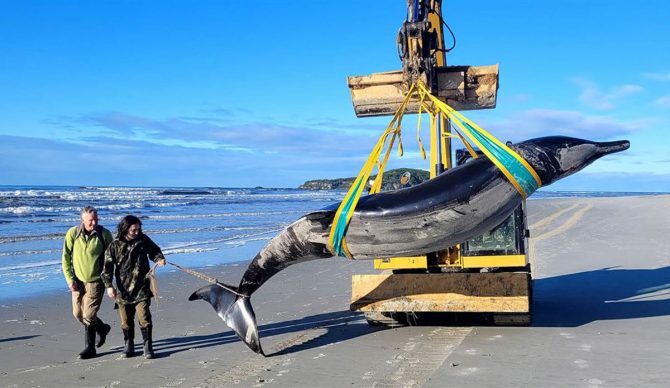
One of six spade-toothed whales ever seen washed up fully intact in July. Photo: New Zealand Department of Conservation/CC BY 4.0
The spade-toothed whale is extraordinarily rare. So rare, in fact, that until July 4, only five of them have ever been documented. But a spade-toothed whale recently washed up on a beach in Otago, New Zealand, bringing that small number up to six.
New Zealand is a place that sees a higher-than-average number of marine mammal strandings. According to IFLScience, the country averages around 85 every year. So when the Department of Conservation (DOC) and The Museum of New Zealand Te Papa Tongarewa answered a call about a dead beached whale, they weren’t all that surprised. When they arrived on site, however, the responders’ jaws hit the floor.
“Spade-toothed whales, however, really do take the rarity biscuit – only six specimens, including this latest find, have ever been recorded,” IFLScience reported. “While its identity still needs to be confirmed via DNA testing, if all goes as expected, this makes the male that washed up in Otago a particularly significant find.”
Of all creatures alive on Earth today, spade-toothed whales are one of the most mysterious.
“Spade-toothed whales are one of the most poorly known large mammalian species of modern times,” said DOC Coastal Otago Operations Manager Gabe Davies in a statement. “Since the 1800s, only six samples have ever been documented worldwide, and all but one of these was from New Zealand. From a scientific and conservation point of view, this is huge.”
Up until a little over a decade ago, researchers only had skeletal remains to study. Then, in 2010, a mother and her calf were found intact followed by another in 2017. With three specimens to study, researchers were finally able to see what a spade-toothed whale looks like when it’s got its flesh on.
Since no one has ever seen a spade-toothed whale alive, we know nothing at all about how it behaves. It’s theorized that it is similar to other deep-water species that live in the deep sea and prey mainly on cephalopods and small fish, but those are just guesses.
After it was recovered, the body of the whale was placed in cold-storage, where it will undergo a battery of studies. It’s fresh enough to likely provide the first real opportunity for a thorough dissection, but that might take a while. Since the whale carcass is so incredibly rare, scientists want to take their time figuring out the best course of action.
Whatever they decide to do, the find will likely shed light on knowledge that has, until now, been completely in the dark.

